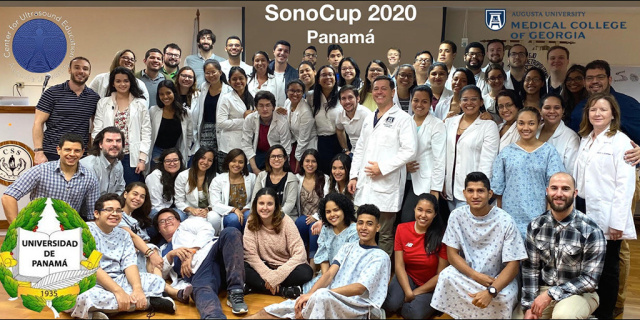

Emergency physician Matthew Lyon, MD FACEP, of the Medical College of Georgia at Augusta University is actively involved in an ultrasound education exchange with medical students and residents at the University of Panama. The school is currently teaching 1,000 medical students in point-of-care ultrasound (POCUS) with a six-year curriculum. “We developed a relationship with the University of Panama,” Dr. Lyon explains. “We train their medical students in how to use ultrasound as both an educational tool to learn anatomy and physiology and in the point of care.”
Sonosite iViz has been the device of choice for this educational exchange. “In the past, it was difficult to get portable ultrasound machines into the country,” Dr. Lyon says. “We would get hung up in customs when we brought in a lot of machines. The ultra-portable Sonosite iViz makes life so much easier.”
Teaching POCUS Skills with Sonosite iViz
Dr. Lyon’s team used Sonosite iViz machines for hands-on training sessions and in scanning rounds. The course is comprehensive, including ultrasound for eye, heart, lung, shock, and MSK applications. “We use the Sonosite iViz for demonstrations, put the students into small groups, and then we take them to the hospital to look for pathologies,” Dr. Lyon says. “It’s a game changer because it’s so ultra-portable. We have multiple batteries, so we can use it for hours. We just swap out the batteries as we need to.”
Dr. Lyon finds POCUS education a rewarding experience. “The students’ eyes light up when they get to see pathology they have studied. It is really exciting and a true pleasure to be able to teach medical students at home in the U.S. and in another system like the University of Panama.”
Finding a Rare Pathology
Dr. Lyon recalls one interesting discovery his students made when using the Sonosite iViz.
“The University of Panama is a very large hospital, so there were lot of people waiting in the hall. We were just scanning the people in the hall, and we found one lady just waiting for care, and we didn’t know why she was there. The students happened to be studying the abdomen at the time, so we scanned her liver. We then found a gallbladder mass. It turns out her doctors thought she had some sort of cancer because she had been losing weight, but didn’t know where the cancer was. Because of our scan, the doctors knew to get a CT of her abdomen, and found the gallbladder cancer. Gallbladder cancer is not that common in the U.S., so it was a rare diagnosis.”
The Future of POCUS in Panama
Dr. Lyon has long term goals for ultrasound education in Panama.
“A lot of people use ultrasound internationally, but there is not a lot of people work with medical schools on a structured basis. Our school goes to Panama every six months, sometimes more often, and ultrasound is part of our students’ curriculum. The students in Panama have to learn ultrasound, but they really don’t have many people in-country who can teach POCUS. It’s a unique relationship where we give the Panamanian students this essential expertise. As we’re doing this, they’re graduating more and more people that now have an understanding of ultrasound. We’re helping to build the infrastructure of people so hopefully over time, they won’t need us anymore.”

